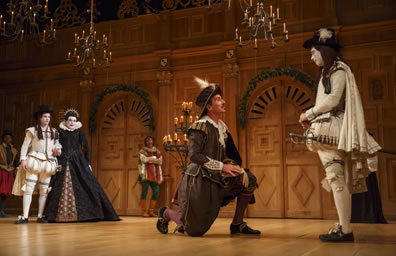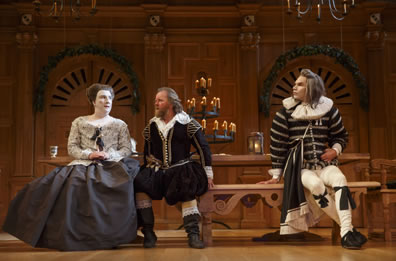Twelfth Night
Unleashing Shakespeare's True Genius
Shakespeare's Globe, Belasco Theatre, New York, N.Y.
Friday, November 1, 2013, D-109&110 (center stalls)
Directed by Tim Carroll
Olivia has just sent Malvolio off with a ring to give the recently departed Viola (as Cesario). Next scene, Viola walks on stage, and being the seasoned Shakespeare vet watching my 20th Twelfth Night, I am highly anticipating her scene with Malvolio, so delightful has this production been. But that's not Malvolio entering the stage behind Viola. "Will you stay no longer? Nor will you not that I go with you?" the man says.
Ohmygosh, that's Antonio talking; and that's not Viola, that's Sebastian. Of course, the first Sebastian-Antonio scene comes at this point (I forgot that—but I wasn't the only one in the audience). However, Samuel Barnett playing Viola and Joseph Timms playing Sebastian wearing the same style clothes—as Viola later explains, "He went still in this fashion, color, ornament, for him I imitate"—look so much alike that it creates this wonderful gotcha moment.

Orsino (Liam Brennan) kneels to propose to Viola (Samuel Barnett) in the final scene of Twelfth Night, the Shakespeare Globe's production just opened on Broadway. Viola is dressed like her twin brother, Sebastian (Joseph Timm) watching with Olivia (Mark Rylance) and Feste (Peter Hamilton Dyer). Photo by Joan Marcus, Shakespeare on Broadway.
Clearly, that was Shakespeare's intent in the way he arranged these scenes, and it is just one of many such moments of clarity in this Shakespeare's Globe production come to Broadway. With Mark Rylance playing Olivia as the company's centerpiece, this is an all-male, original-practice production down to the use of candles lighting the stage (the production's only demerit—and I mean only demerit—is the wax dripping from the chandeliers creating something of a distraction in the later scenes). This may sound like gimmicky Shakespeare, but in fact it is the purest Shakespeare I have ever seen.
Director Tim Carroll keeps the stage action simple and allows Shakespeare's stagecraft genius to envelop us in his plot. The actors concentrate on giving poetical passages poetical resonance, yet every performance is naturalistically rendered: just people speaking gorgeous iambic pentameter as a matter of everyday existence. Instead of visual amplification of the text, the players rely on subtle gestures and phrasings to draw out their lines' comic richness. When Malvolio reading the supposed letter from Olivia is instructed to "revolve," Stephen Fry does not revolve. Shakespeare doesn't tell him to, but you expect it because you've seen it done that way countless times before. Yet, when Malvolio proclaims, "I will smile," a smile bursts through Fry's serious facade with the impatient ferocity of a bull bolting into the arena, and our own laughing smiles genuinely erupt.
It's tempting to take this discussion down a track beyond the positive qualities of text-centric Shakespeare and even original-practice Shakespeare to claim that authentic presentation of Shakespeare might be the key to the production's success at unleashing Shakespeare's genius so well. With production design by Jenny Tiramani, the oak screen spanning the width of the back stage with two doors on either side of the candelabra centerpiece is meant to resemble a great manor hall or the Inns of Court where Shakespeare's company often played. The costumes are not only Elizabethan but authentically constructed with fabrics replicating that of the 1590s. The musicians play authentic rauschpfeifes (a big clarinet), Sackbuts (a little trombone), recorders, lutes, and a wood hurdy gurdy played like a guitar across the hip but with one hand turning a crank and the other fingering keys. Feste (Peter Hamilton Dyer) plays a pipe and tabor simultaneously, and when he sings the fool's songs in Twelfth Night, he is using the tunes scholars have identified as contemporary versions.
And, yes, this theatrical theory would extend to the all-male cast. Anybody familiar with Shakespeareances.com knows that I strongly advocate gender-neutral casting, but for the sake of Shakespearean discussion I feel it necessary to broach the possibility that Shakespeare didn't necessarily write women's characters so brilliantly but, rather, he wrote scripts specifically for boys and men playing women. After all, though I have seen many a good Viola, Olivia, and Maria, I have never seen the three so expertly rendered as by, respectively, Barnett, Rylance, and Paul Chahidi. Furthermore, the Viola-Sebastian confusion is easier to pull off if both are men in similar makeup and costume, though one is playing a woman playing a man.
But now that I've broached it, I will immediately back away. These performances have more to do with acting talent, verse-speaking skills, and respect for the text than with the fact that they are carried out by men. Besides, the whole cast is exceptional.
Starting with Rylance, the keystone of this enterprise. The Globe's former artistic director, Rylance re-mounted the Globe's 2002 Twelfth Night production for the 2012 season, running in repertoire with Richard III, and reprised his portrayal of Olivia from the 2002 staging. The repertoire proved so successful it moved to London's West End for a sold-out run over the winter and was then brought to Broadway. Though Rylance has won two Tony Awards (for Jerusalem and Boeing-Boeing), this is his first Shakespeare in New York. You are likely to enter the theater expecting great things from him and will quickly realize your expectations were set way too low.
Rylance's Olivia starts as a stiff, almost matronly woman, in black, usually veiled, literally worshiping the memory of her dead brother (a cloak laid upon his seat at the other end of the table). He moves with such tiny steps, Olivia seems to glide across the stage like a wound-up porcelain doll on wheels. Everything about her movements and expressions is so painfully formal it's hilariously funny. And that's before Viola first visits Olivia and undoes her quite. "What is your parentage?" she asks Viola almost impetuously and then immediately realizes she's crossed a line and tries to rush back to neutral demeanor not quite successfully. This is Rylance, understanding the importance of this simple line—that it is a point of establishing the person's degree which is a first step toward marriage viability—and using it for both character development and comic effect. Further, it sets up an even funnier moment when Rylance's Olivia recalls that interchange after Viola departs. "What is your parentage?" she says, and Rylance inserts an audible "Oh my god" here and the body language of a woman psychologically beating herself up for being so stupid. Yes, the verse is purely rendered (and I could detect no cuts in this three-hour-plus production), but the actors are allowed the occasional and most appropriate verbal exclamation points.
Olivia is soon a neurotic mess. Rylance begins stuttering her lines in nervous excitement, and she has a penchant for being so overcome with passion she collapses in a heap of authentic Elizabethan linen. She throws a shoe at Sir Andrew Aguecheek, and when she comes upon Sir Toby Belch dueling with Sebastian (whom she thinks is Cesario), she runs off stage and re-emerges with a huge battle axe, with which, in her excitement, she almost takes out Sebastian along with Toby, Aguecheek, and Fabian. Upon seeing the two Cesarios, she jumps up and down like a little girl at the cotton candy stand: "Most wonderful!"
Barnett's Viola is a study in stillness. "O time, thou must untangle this, not I," is Barnett's foundation line, giving us a Viola for whom patience is a bedrock of faith and comfort. She most needs it not when she is pleading the case for pining women to Orsino (a passion-on-his-sleeve Liam Brennan) but, later, when Olivia turns up the courtship pressure. "I am not what I am," she tells the countess, who replies, "I would you were as I would have you be." "Would it be better, madam, that I am? I wish it might, for now I am your fool." As Viola speaks these lines, the pain of her brother's death, her own unrequited love, and her knotty fate play out in Barnett's expression, and we see Viola's valiant effort to hold up under the weight of her situation.
Chahidi is a prim and proper tease as Maria. He plays the woman balancing her sense of formal service to Olivia with her adoration of Toby Belch (Colin Hurley as a proud, loose cannon), and her loathing of Malvolio comes off as more jealousy than reaction to abuse. Notably, while we see Rylance when we watch Olivia, and we see Cesario when we watch Viola (and Sebastian), we see Maria when we watch Chahidi. This is not a man playing a woman or a man playing a woman playing a boy; this is Olivia's waiting-woman and a bit of a loose cannon herself, planting a kiss on Toby after he calls her Penthesilia and pouring wax from a candle into Malvolio's cell.

Maria (Paul Chahidi, left) hatches her plot against Malvolio with, from left, Toby Belch (Colin Hurley) and Andrew Aguecheek (Angus Wright) in the Shakespeare's Globe production of Twelfth Night, which just opened on Broadway. Photo by Joan Marcus, Shakespeare on Broadway.
It is in Fry's portrayal of Malvolio that this production seems most revolutionary by hewing so close to the text. Fry's Malvolio is not a clown; he is not a villain. He is "a kind of puritan," serious, self-centered, holier-than-thou, and quite a good administrator of his lady's household. His tragic flaw is not any of these things—though arrogant Toby doesn't like his arrogance, and the duteous Maria doesn't appreciate his demands. His tragic flaw is that he fantasizes the possibility that his lady might some day love him. Raise your hand if you have fantasized a similarly impossible coupling for yourself (as I have for a certain celebrity who has no idea I exist) and, if you have raised your hand, ask whether it is fair that his fantasy not only should be exposed but that it should lead to his humiliation and imprisonment as revenge for merely remonstrating Feste, Toby, and Maria. This is the first Twelfth Night in which I felt a deep connection to Malvolio, and when he shouts, "I am happy!" reading Olivia's supposed love note, I ache for him.
Actually, I found myself identifying with every one of these Shakespeare creations so tellingly presented here, from Rylance's Olivia smitten with so long a shot she can't even fathom how far out of reach Cesario is, to Angus Wright's Andrew Aguecheek, ever self-aware of his state and shortcomings but maintaining a facade of pride as best his limited skills allow him and hanging on to his own long-shot hope. In these uncluttered portrayals, look for the details. Viola's foot begins twitching as she and Orsino listen to Feste sing and Orsino wants a physical connection with Cesario. Aguecheek keeps checking his purse, and his expression tells us he really doesn't want to write the challenge to Cesario. Olivia's faux love letter becomes crumpled and torn in succeeding scenes as Malvolio obviously consults it over and over and over.
Such details emerge even before the play starts as the cast get into makeup and costume on stage (be sure to arrive a half hour before curtain to watch this practice). It's part of the original practice aesthete, but it also offers a fascinating look at the character-building process as the dressers literally build the women. Note how Rylance and Chahidi in particular start submerging into their characters, Rylance even practicing Olivia's walk.
From well before the play's first line to the dancing curtain call well after the last line, this production, simply put, is simply brilliant.
Eric Minton
November 12, 2013
Comment: e-mail editorial@shakespeareances.com
Start a discussion in the Bardroom



 Find additional Shakespeareances
Find additional Shakespeareances